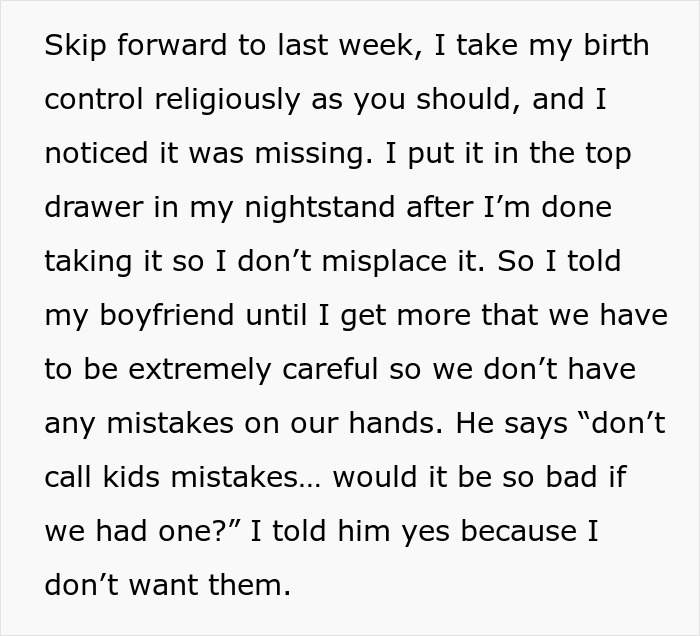However, redditor’s Accomplished-Hat3121 case is one example of what not to do if your significant other is set on not wanting children. At first, they were on the same page about living a kid-free lifestyle, but somewhere along the way, the boyfriend changed his mind. Instead of communicating this directly to her, he decided to tamper with contraception without her consent. Scroll down to find the full story and a conversation with registered clinical counselor and psychotherapist Ronald Hoang, who kindly agreed to elaborate on partners having a change of heart about starting a family.
The decision to start a family should be mutual
Share icon Image credits: thelivephotos (not the actual image)
However, this boyfriend tried to “baby trap” his girlfriend because she was always adamant about not wanting children
Share icon Image credits: Nate Grigg (not the actual image)
Share icon Image credits: Prostock-studio (not the actual image)
Image credits: Accomplished-Hat3121
There’s a strong possibility that a person will change their mind about wanting children
Bored Panda reached out to clinical counselor and psychotherapist Ronald Hoang, who explains that one shouldn’t go into a relationship hoping to change the partner’s mind about big life decisions. Instead, they should start with whether they’re fine with living with the difference. However, he notes, “But of course, life happens and people change their minds. Ideally, a couple should look to have an open conversation about having kids to see whether it’s possible they could be on the same page or perhaps look to compromise. Questions to unpack would be: What has happened that changed your mind? What makes it important now compared to before? Is there a deeper purpose or goal for you? How does it relate to your values or beliefs? Is there a fear of not having this happen?” He further suggests that couples may even try exploring more creative arrangements, such as being a single parent while being partnered or opening up the relationship to another person who would gladly take on the responsibility of parenting a child. “If a couple finds they aren’t on the same page, they can’t compromise, or there aren’t creative solutions, at some point, the partner hoping for a child might need to come to a decision whether they are okay to live without a child and stay in their relationship, or be with a child but without their relationship, weighing whether their need for a child is more of a priority than the relationship,” Hoang adds.
Sabotaging a partner into having a child shouldn’t be an option in the first place
However, forcing or sabotaging a partner into having a child shouldn’t even be an option in the first place, as it was for the boyfriend in this story. Such behavior interfering with contraception use and pregnancy is called reproductive coercion. This term might be unfamiliar to some, as it’s often colloquially called a baby trap. It happens when a man or woman deliberately tries to have a baby without the other’s consent for all sorts of reasons. It might be an attempt to maintain the current relationship, seek control, or fulfill the desire to be a parent. This can be done by refusing to use contraception, lying about using a variant of birth control, tampering with it, or even pressuring, guilting, or shaming a partner about their decision on wanting or not wanting children. Hoang explains, “Baby trapping is not a solution to the problem, but a manipulation of the situation that would likely lead to a rupture in the relationship and feelings of betrayal. A relationship can recover, but not without major healing. There would need to be repair of the relationship, rebuilding of trust, and discussion of the relational contract between partners and the parent-child relationships.” As was mentioned by many commentators under redditor’s post, reproductive coercion can, at times, even be a form of physical abuse. If a woman becomes pregnant, the abuser might use the offspring to maintain power and control. For instance, the parent might be threatened that the child will be taken away if they aren’t doing what they’re told. It’s clear that no one in this equation deserves to be treated this way, and healthcare providers are doing their best to provide support and resources to avoid this from happening. During annual health or prenatal exams, they ask questions related to mental health and intimate partner violence. Along with it, they also offer discreet and confidential methods of contraception, such as IUDs with shorter strings, birth control injections or implants, emergency contraception, or birth control pills in anonymous packaging.
People shared their shock in the comments, as well as some advice
Anyone can write on Bored Panda. Start writing! Follow Bored Panda on Google News! Follow us on Flipboard.com/@boredpanda!

























